Oliver: Hey! What makes you so sure I went to Prep School?
Jennifer: You look stupid and rich.
Oliver: Well, what if I’m smart and poor?
Jennifer: I’m smart and poor.
Oliver: Well, what makes you so smart?
Jennifer: I wouldn’t go out for coffee with you, that’s what.
Oliver: Yeah. Well I wouldn’t ask you.
Jennifer: Well, that’s what makes you stupid.
It’s the feast of St. Valentine. One of my favourite days of the year. Rosebuds are a —budding, and my seedlings (in a plastic, hot-house incubator thing upstairs) are a —sprouting. There’s hope. The appalling London weather, a consistent grey fug which lasts from January to April, as if in a bowl or a clay swamp, continues. Yet the promise of a raw April morning beckons. It’s weird, though, that the day of love should commemorate a 3rd-century Roman saint and martyr, decapitated for his belief. Historically, the association with the 14th of February comes, I seem to remember (and please do correct me if I’m wrong) from the Medieval idea that love birds mated on a specific day of the year, in Spring. And for some reason, that day settled on February 14th.
Love Story (1970) is based on Eric Segal’s bestseller of 1970, and Segal wrote the script for the film concurrently with his novel. An astute move, financially, as the book hit the shops ready for Valentine’s Day, 1970. Interestingly, Segal was an academic who based his novel and script on the actions and philosophy of the young people he saw daily on campus. Seriously brainy, he taught Latin and Greek literature at Harvard, Yale and Princeton. He was also a Supernumerary Fellow and Honorary Fellow at Wolfson College, Oxford, an athlete and later Olympic television commentator. According to Wikipedia — that simple sword of truth — Love Story (1970) became one of the highest-grossing films of all time if adjusted for inflation. The film was a phenomenal success.
Ryan O’Neal is Oliver Barrett IV, a Harvard undergraduate from an upper-class East Coast background. Jennifer (Ali MacGraw) is his chippy, feisty, feminist girlfriend, or potential girlfriend, from a less salubrious, working-class background, presumably American-Italian? She’s reading music at Radcliffe. I rather like the Ali MacGraw character; she grows on you as the film moves on, although her rather passive-aggressive chat-up line makes me want to run a mile — but then I’m not Oliver Barrett IV. On the other hand, I suppose, she’s a challenge. It’s a film about privilege. Oliver’s a serious catch. And Jennifer’s different. A refreshing contrast to the husband-hunting girls from the sort of background he’s used to. And she’s the grown-up in the relationship, too. Oliver’s angry, damaged and screwed-up: he’s impetuous; he shoots from the hip. He may need to go on an anger management course (but then, who doesn’t shoot from the hip at the age of twenty-two?) His buzzy, skiddy little MG TD mirrors his frustrations, especially with his parents: Mother (formal, twinset and pearls) and patrician Father (Ray Milland): cold, aloof, and possibly snobbish. Jenny’s father (John Marley) bakes cookies.
There was a time in the 80s, I seem to remember, when certain people dismissed Love Story as romantic slush, in the same way that the music of Burt Bacharach was consigned to the lift. These days, I think, we can look at it with fresh eyes: Under Arthur Hellier’s elegant and understated direction, it’s a beautifully made and thoughtful film, with sensitive transitions and a creative use of the zoom, as films from the early 70s so often are. And it’s a lovely snapshot of the period, in all its autumnal, camel coated, buttoned-down Brooks Brothers, E-Type tweediness. The harpsichord recital (Bach’s Concerto no. 3 for Harpsichord in D major) is typical. Baroque Around The Clock. And oh, it’s a genuine weepie! Without giving too much away, that tracking/zoom shot towards the end of the film, presumably taken from a crane on high — of the couple in Central Park in the snow. It cracks me up. But then I’m a big softie. You may be made of sterner stuff. Incidentally, that tagline: ‘Love means never having to say you’re sorry…’ According to the internet it is, apparently, “one of the most ‘iconic’ (their word) lines in movie history”. I’m never entirely sure about that one. Is that really the case? What does it mean? I find myself saying ‘sorry’ all the time.
And we need to mention Francis Lai’s classically inspired score, a romantic piano concerto, a little bit in the manner of Bach, perhaps, or more probably Mozart. And the scat sound of Snow Frolic. I’m a great believer in cinema soundtracks — which so often go overlooked. Sometimes people writing about films barely mention them. This idea that a soundtrack can make a film. Remove Max Steiner’s sweeping theme from Gone with the Wind (1939), Michel Legrand’s Concerto for Two Pianos in The Go-Between (1971), or Ennio Morricone’s beautiful, poignant track from Cinema Paradiso (1988), and you’re left with something entirely different.
Love Story was nominated for seven Oscars (deservedly winning an Oscar for best score) becoming the sensation, otherwise, of 1970. Lovely performances from the two fathers, Ray Milland and John Marley — and Francis Lai’s theme became a romantic staple the following year, with Andy Williams’ single, Where Do I Begin? crooning its way to Number One in the Easy Listening chart. Schmaltz aside, Love Story is a film about class. About privilege, about empathy and understanding (or more likely, a lack of it) and failed judgement (from both father and son) — and of course, the meaning of love. As our dear King once said long ago, “Whatever that means.”
I was intending to write four posts over Valentine’s Day (one today for the ‘paid’ subscribers, another one on Sunday for everybody, plus two extra freebies), but I’m afraid I am going to have to postpone that for another time. Usually, I stick to my two posts every weekend rigorously, like clockwork. But I've not had a good week.
I rang my 91 year old mother on Thursday. “How are you?”, I said. “Not very well”. She had been lying in bed for three days and hadn't told anybody. I normally try and ring her every day if I can (following the death of my Father last October she now lives alone) but, you know how it is — article deadlines, sorting out customs paperwork for an antiques shipment, stuff like that, bogged me down. To cut a long story short, following a doctor's visit and an emergency ambulance, the poor girl's now in the Radcliffe with a heart attack. But still with us. And doing well. Which means that I will have to skip Sunday’s post. And make this post free for everybody to read.
I’m about to jump in the car and drive back down again to Oxfordshire and so, alas, won’t have the time to watch Sunday’s intended film, Claude Lelouch’s Un Homme et Une Femme (1966), which of course, has another fabulous soundtrack from Francis Lai. But that’s for another day.
I watched Love Story (1970) for free, on a social media site, and the image quality was pretty good— altho’ I do have an old VHS copy upstairs somewhere. Languishing in a tatty cardboard box. Strangely, Love Story doesn’t seem to be available on Amazon Prime Video, but it might well be found on other platforms, especially in America. And, as you might expect, it’s available on DVD and Blu-ray. Love Story, the album of the original soundtrack, with music composed by Francis Lai, is also available to download on Spotify.
That was film no.122. And we’re motoring! A quick word about the difference between a ‘paid’ subscriber (£5 a month or £50 a year) and a free subscriber. Become a ‘paid’ subscriber and you’ll get an extra, exclusive post on Friday mornings, plus further ‘bonus’ posts on High Days and Holy Days and access to the entire WEEKEND FLICKS. archive which now includes 122 film recommendations. Worth thinking about. Free subscribers get the universal post (which can be read by all) on Sunday mornings. Either option’s a good bet.
I’ll be back on Friday. In the meantime, I need a stiff drink.

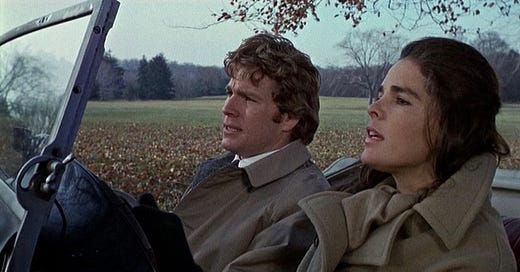




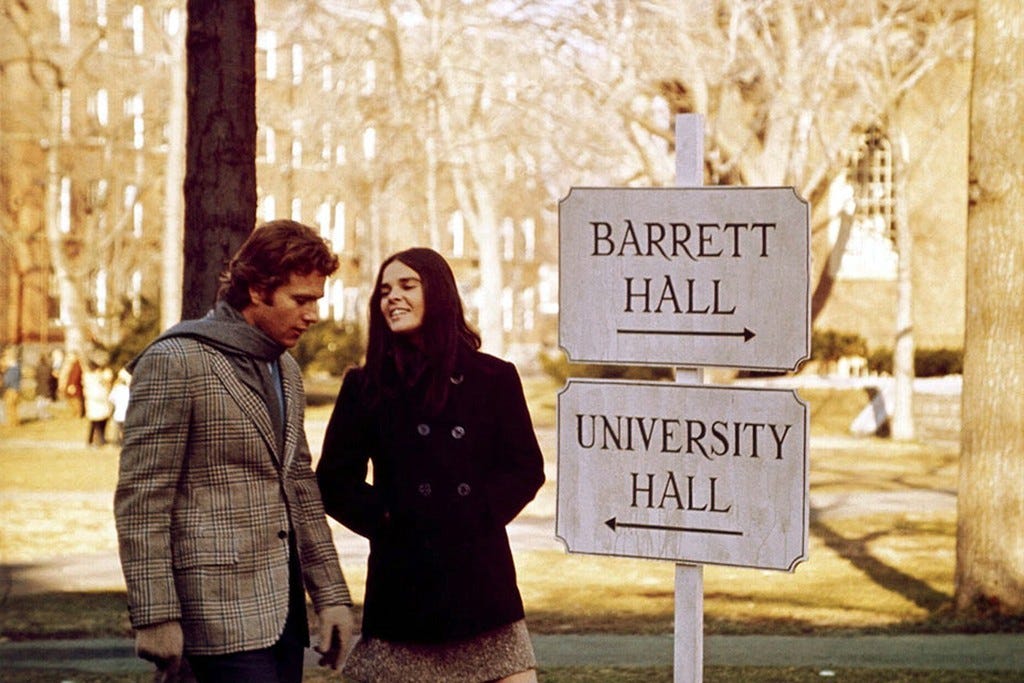
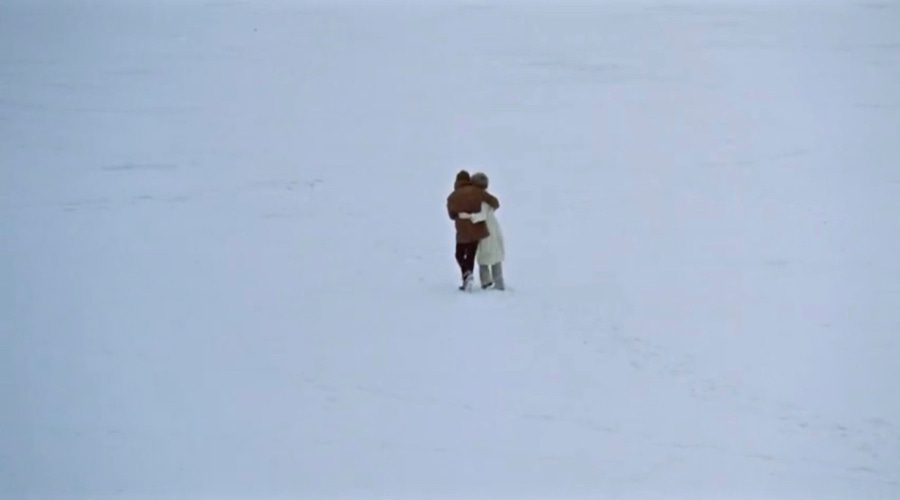
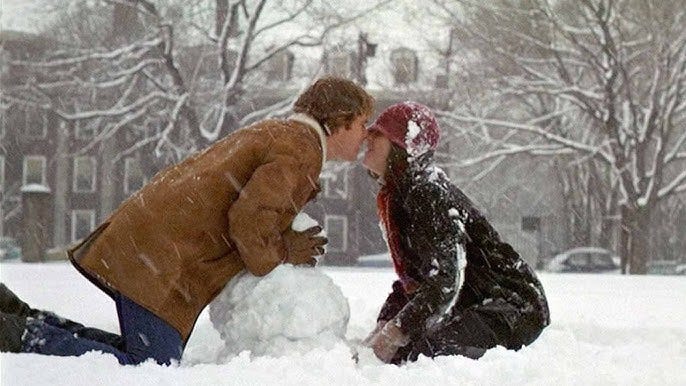

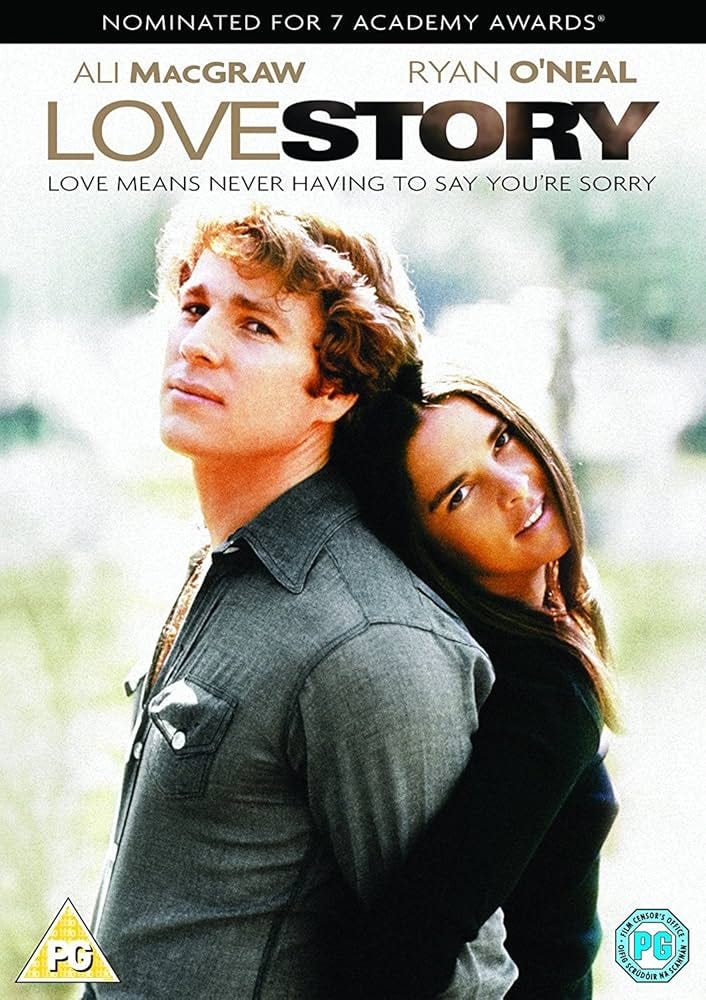
Wishing you well Luke. Don't rush back. We'll all still be here waiting for your wisdom, no hurry. LOVE Love Story.
Echoing the good wishes, Luke.